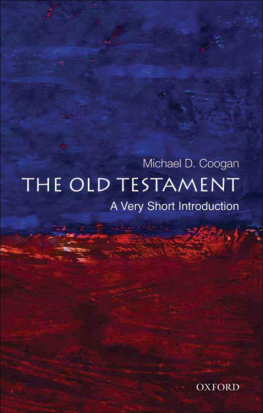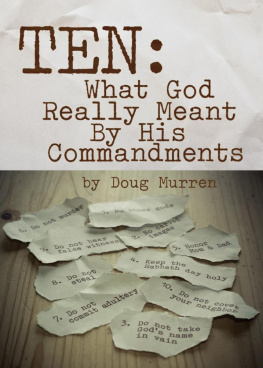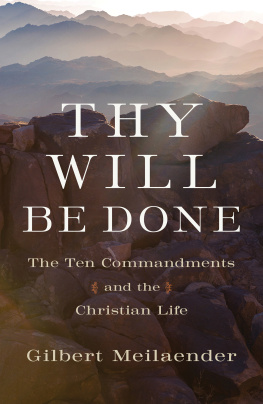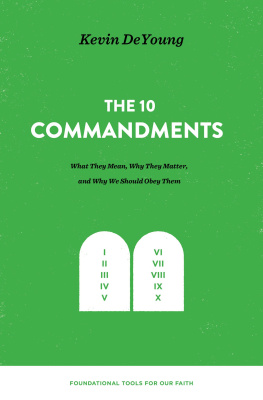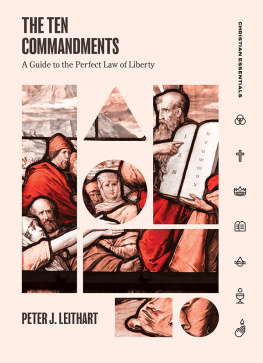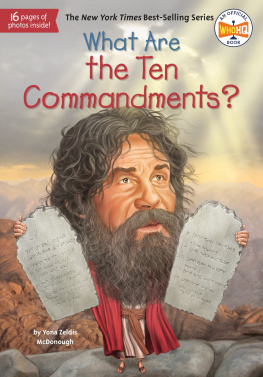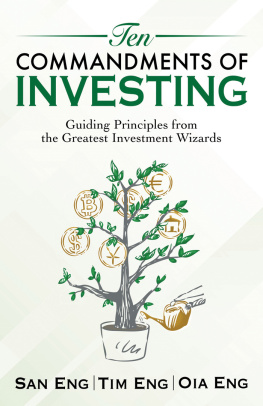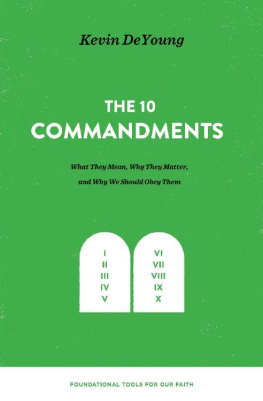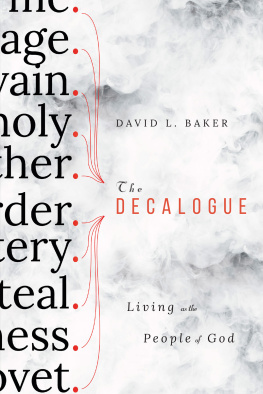THE TEN COMMANDMENTS
THE TEN COMMANDMENTS
A Short History of an Ancient Text
Michael Coogan
Yale
UNIVERSITY PRESS
New Haven & London
Published with assistance from the Louis Stern Memorial Fund.
Copyright 2014 by Yale University.
All rights reserved.
This book may not be reproduced, in whole or in part, including illustrations, in any form (beyond that copying permitted by Sections 107 and 108 of the U.S. Copyright Law and except by reviewers for the public press), without written permission from the publishers.
Yale University Press books may be purchased in quantity for educational, business, or promotional use. For information, please e-mail (U.K. office).
Designed by James J. Johnson.
Set in Stemple Garamond type by Newgen North America, Inc.
Printed in the United States of America.
Library of Congress Cataloging-in-Publication Data
Coogan, Michael David.
The ten commandments : a short history of an ancient text / Michael Coogan.
pages cm
Includes bibliographical references and index.
ISBN: 978-0-300-17871-5 (cloth : alk. paper)
1. Ten commandmentsCriticism, interpretation, etc. I. Title.
BS1285.52.C66 2014
222'.1606dc23
2013046737
A catalogue record for this book is available from the British Library.
This paper meets the requirements of ANSI/NISO Z39.48-1992 (Permanence of Paper).
10 9 8 7 6 5 4 3 2 1
For Margaret Coogan and Elizabeth Lueke with love
CONTENTS
THE THREE BIBLICAL VERSIONS OF THE TEN COMMANDMENTS
(Superscript numerals indicate verse numbers.)
THE TEN COMMANDMENTS IN EXODUS 20
1 2I am Yahweh, your god, who brought you out from the land of Egypt, from the house of slaves. 3You should have no other gods besides me.
2 4You should not make for yourself a graven image, or a form of whatever is in the heavens above or on the earth beneath or in the waters under the earth. 5You should not bow down to them and you should not serve them. For I, Yahweh, your god, am a jealous god, punishing sons for fathers sins to three and four generations of those who hate me, 6but showing steadfast love to thousands of generations of those who love me and keep my commandments.
3 7You should not use the name of Yahweh, your god, for nothing, because Yahweh will not acquit anyone who uses his name for nothing.
4 8Remember the day of the Sabbath to make it holy. 9Six days you may work and do all your tasks, 10but the seventh day is a sabbath to Yahweh, your god. You should not do any task: you or your son or your daughter, your male slave or your female slave, or your cattle, or your resident alien who is within your gates. 11For in six days Yahweh made the heavens and the earth and the sea and all that is in them, but he rested on the seventh day. For this reason Yahweh blessed the day of the Sabbath and made it holy.
5 12Honor your father and your mother so that your days may be long on the land that Yahweh, your god, is giving to you.
6 13You should not murder.
7 14You should not commit adultery.
8 15You should not kidnap.
9 16You should not reply as a false witness against your neighbor.
10 17You should not scheme against your neighbors house; you should not scheme against your neighbors wife, or his male slave or his female slave, or his ox or his donkey, or anything that is your neighbors.
THE TEN COMMANDMENTS IN DEUTERONOMY 5
1 6I am Yahweh, your god, who brought you out from the land of Egypt, from the house of slaves. 7You should have no other gods besides me.
2 8You should not make for yourself a graven image, a form of whatever is in the heavens above or on the earth beneath or in the waters under the earth. 9You should not bow down to them and you should not serve them. For I, Yahweh, your god, am a jealous god, punishing sons for fathers sins to three and four generations of those who hate me, 10but showing steadfast love to thousands of generations of those who love me and keep my commandments.
3 11You should not use the name of Yahweh, your god, for nothing, because Yahweh will not acquit anyone who uses his name for nothing.
4 12Observe the day of the Sabbath to make it holy, as Yahweh, your god, commanded you. 13Six days you may labor and do all your tasks, 14but the seventh day is a sabbath to Yahweh, your god. You should not do any task: you or your son or your daughter, or your male or female slave, or your ox or your donkey or any of your cattle, or your resident alien who is within your gates, so that your male slave and your female slave may rest like you. 15Remember that you were a slave in the land of Egypt, and Yahweh, your god, brought you out from there with a strong hand and an outstretched arm. For this reason Yahweh, your god, commanded you to keep the day of the Sabbath.
5 16Honor your father and your mother as Yahweh, your god, commanded you, so that your days may be long and so that it may be good for you on the land that Yahweh, your god, is giving to you.
6 17You should not murder.
7 18And you should not commit adultery.
8 19And you should not kidnap.
9 20And you should not reply as a false witness against your neighbor.
10 21And you should not scheme against your neighbors wife; and you should not crave your neighbors house, his field, or his male slave or his female slave, his ox or his donkey, or anything that is your neighbors.
THE TEN COMMANDMENTS IN EXODUS 34 (THE RITUAL DECALOGUE)
1 10Behold, I am making a covenant. Before all your people I will do wonders that have never before been created on all the earth or among all the nations; and all the people in whose midst you are will see how awesome is Yahwehs deed, which I will do with you.
2 11Keep what I am commanding you today. I will drive out before you the Amorites, the Canaanites, the Hittites, the Perizzites, the Hivites, and the Jebusites. 12Take care not to make a covenant with the inhabitants of the land which you are entering, so that it becomes a snare in your midst. 13Rather, you should tear down their altars and you should break their standing stones and you should cut down their sacred poles. 14For you should not bow down to another god, for YahwehJealous is his name!is a jealous god. 15Nor should you make a covenant with the inhabitants of the land, who are promiscuous with their gods and sacrifice to their gods, so that one of them calls to you and you eat of his sacrifice. 16And you will take some of his daughters for your sons, and his daughters will be promiscuous with other gods and will cause your sons to be promiscuous with their gods.
3 17You should not make for yourself molten gods.
4 18You should keep the festival of unleavened bread. For seven days you should eat unleavened bread, as I commanded you, at the appointed time in the month of Abib, because in the month of Abib you went out from Egypt.
5 19All that first issues from the womb is mine, all your livestock that have a male first issue, ox and sheep. 20The first issue of a donkey you should buy back with a sheep; if you do not buy it back, then you should break its neck. The firstborn of your sons you should buy back. Let no one appear before me empty-handed.
6 21Six days you may work, but on the seventh day you should rest. Even at plowing-time and harvest-time you should rest.
7 22You should observe the festival of weeks, the first fruits of the wheat harvest, and the festival of gathering at the turn of the year. 23Three times a year, all your males should appear before the lord Yahweh, the god of Israel. 24For I will dispossess nations before you and I will widen your border, and no one will scheme against your land when you go up to see the face of Yahweh, your god, three times a year.
8 25You should not offer the blood of my sacrifice with leaven. And the sacrifice of the Passover festival should not remain overnight until morning.
Next page

